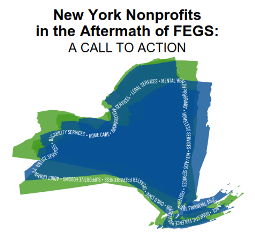Categories: Funding
03.14.2016
Despite the clear importance of these services, government contracts rarely cover the full costs.
 Guest post by Allison Sesso, Executive Director, Human Services Council of NY
Guest post by Allison Sesso, Executive Director, Human Services Council of NY
New York’s nonprofit human services providers deliver essential services that help people live stable and productive lives. The government transfers these support functions to the more efficient and nimble nonprofit sector in order to save on costs. For the current fiscal year, the combined value of government human services contracts in New York is estimated at more than $5.8 billion.
Supportive housing is a clear example of this model. By providing holistic, innovative programs, supportive housing organizations reduce public spending on costly emergency interventions like hospital and shelters, and help maximize the human potential of countless individuals.
Despite the clear importance of these services, government contracts rarely cover the full costs of running these programs. These budget gaps have resulted in severe fiscal challenges throughout the sector. An alarming number of organizations have recently closed their doors or merged with another organization, including Alianza Dominicana, GroundWork, Day Top Villages, Palladia, and the $250 million behemoth, Federation Employment and Guidance Services (FEGS).
In response to these closures, the Human Services Council (HSC) assembled a commission of experts to examine the chronic issues highlighted by these closures. Our findings and recommendations were delivered in a report entitled “New York Nonprofits in the Aftermath of FEGS: A Call to Action”. The report brings desperately needed attention to the issues our sector is facing, and offers solutions to strengthen these organizations.
In addition to recommendations for government and philanthropy, we also identified steps nonprofits themselves should take to accept responsibility for aggressively identifying, assessing, and addressing risks to their fiscal health. Nonprofit human services organizations need to adopt financial evaluation tools and other methods to properly evaluate the risks associated with potential government contracts. These providers must affirmatively identify risks to their survival and collectively act to address them.
Unfortunately, nonprofits have little leverage to shape the terms of their contracts. The amounts they are paid, as well as the timing and conditions of payments, are dictated by government agencies and are rarely negotiable. To help facilitate a more even playing field, the Commission has proposed the establishment of a RFP Rating System and a Government Agency Performance Survey, which will enable providers to make informed decisions about the risks associated with contracts and incentivize government agencies to be more responsive to the concerns of providers.
The RFP Rating System will evaluate the potential financial risks and programmatic issues of proposed government initiatives. This information will enable providers and boards to make informed decisions about whether a program is in the best interests of the organization and its clients. This tool will also shed light on the wide gap between program costs and expectations that are so common in government contracts. Ultimately, we expect this rating system will allows us to engage in more meaningful discussion with government around the real costs of running programs.
We are also proposing the establishment of a Government Agency Performance Survey, which would alert providers to issues that are commonly encountered when organizations contract with specific government agencies. Providers would answer surveys about their experiences working with various agencies, and their responses would be aggregated in an annual report card similar to the annual State of the Subways ratings issued by NYPIRG’s Straphangers Campaign. We believe this would spur the reform of agency practices by spotlighting disparities in contract registration timeframes, inequitable overhead payments, unhelpful staff and other issues.
The human services sector needs to begin operating from a place of strength if we are to address the problems currently threatening our survival. These tools are an important step toward sector empowerment. They will provide organizations with the knowledge they need to properly evaluate risk and help us collectively push back against problematic proposals and practices. Shifts in the government / nonprofit relationship are necessary if we are to ensure the fiscal stability of organizations and position them to better support the wellbeing of all New Yorkers.
